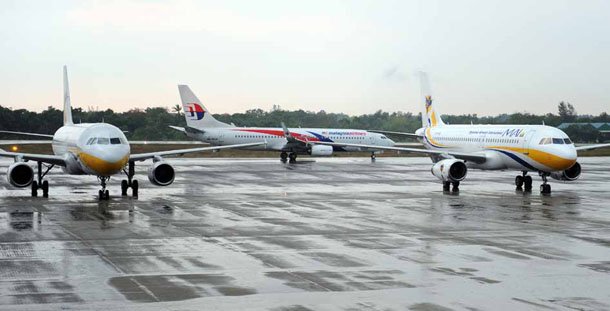RANGOON — Burma’s government will seek to protect its airline industry and initially keep most domestic airports off limits for regional airlines as it implements Asean’s Open Skies policy, which started this year, a senior official said on Tuesday.
Win Swe Tun, director general of the Department of Civil Aviation, told The Irrawaddy that Burmese airlines would struggle to compete with regional airlines when it comes to running international flights to the country as the Open Skies policy takes effect in the coming years.
“We will look at our national carriers’ interests in the competition with regional operators,” he said. “We will not allow other regional airlines to fly to other cities except to Yangon and Mandalay. If they want to fly to other cities they can run charter flights by working with domestic airlines.”
Win Swe Tun said another reason for Burma to limit the number of international carriers flying to the country was a lack of modern airport capacity.
“Yangon international airport couldn’t afford to accept all international airlines flying here, for example, we have only four gates for flights to land at the same time. So we will have to wait until the new Hanthawaddy airport [in Pegu Division] is finished in 2020,” he said.
The Association of Southeast Asian Nations (Asean) Open Skies policy is also known as the Asean Single Aviation Market and would allow airlines of member states to fly freely throughout the region by liberalizing air services under a single, unified air transport market.
The plan is being implemented gradually in the coming years and Asean members will have some leeway to accept degrees of opening up their aviation market to outside competitors.
Since Burma’s economic opening up under President Thein Sein’s nominally civilian government the number of international flights to the country have rapidly increased to 24, almost all of which are operated by regional carriers.
The only local carriers flying international routes in and out of Burma are state-owned Myanmar Airways International and Golden Myanmar Airlines. Until recently, Air Mandalay and Air Bagan used to operate flights to Chiang Mai, Thailand, but these were suspended.
Aye Mra Tha, assistant general manager of Myanmar Airways International, said the company was concerned about the potential impact of the Open Skies policy on its operations.
“I can say we’re still not ready to compete with other regional operators,” she said. “We don’t have any worldwide national carriers like Thai Airways or Singapore Airways. So what we need to know now is how our government will protect us when we compete with others.”
Aye Mra Tha said the government could use local rules and regulations to afford certain benefits to local airlines. “For example, I think the government can offer protection for us if we have priority for landing times while we compete with other regional operators,” she said.
Myanmar Airways International operates flights to seven countries in Asia.
“We have many competitors, not only powerful airlines, also other budget airlines. So this is the time to prepare [for competition], for example by extending our network, increasing flights and improving services,” she said.

















